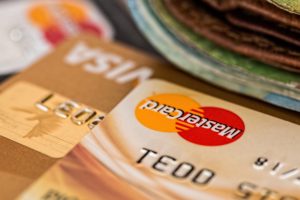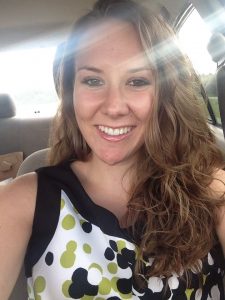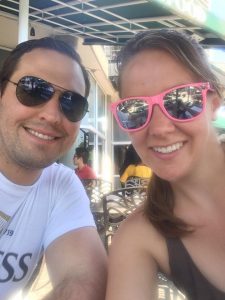Denis O’Brien [0:37]
Welcome to Episode 196. Melanie from Dear Debt. Hey, money clan a very warm welcome to the chain of wealth podcast. I’m your host, Denis O’Brien.
Katie Welsh [0:49]
And I’m Katie Welsh.
Denis O’Brien [0:50]
So Katie, awesome conversation we had with Melanie, and she’s a former guest on the show.
Katie Welsh [0:55]
I love Melanie.
Denis O’Brien [0:57]
So Melanie writes over at Dear Debt. And she encourages readers to submit their breakup story with debt. It’s an absolutely phenomenal site and super inspirational if you are in debt and looking to get out of it.
Katie Welsh [1:12]
Yeah, if you are looking for like a good pick me up because paying off debt sometimes you can really feel like you’re the only person who is in the struggle. And just typing in Dear Debt. It’s like the first thing that pops up on Google and reading other people’s stories is one of the main things that really helped me get through some of my churches.
Denis O’Brien [1:35]
Yeah, what I like is that it’s people’s breakup stories of debt. Like they finally conquered it. And this is their breakup letter. And I think that that’s really cool, ’cause it’s really them saying goodbye to debt forever, which is super inspirational.
Katie Welsh [1:46]
Yeah and on top of that, Melanie also hosts the Lola retreat every year, which is coming up quite soon.
Denis O’Brien [1:55]
Yeah. And we’ll dive into that in today’s episode. So if you guys haven’t already, don’t forget to join our Facebook community. Head on over to chainofwealth.com/group and come and say hi, Alright Kate are you ready to dive in?
Katie Welsh [2:9]
Yep,
Denis O’Brien [2:10]
Fantastic. Let’s do it.
Voice Over [2:12]
Welcome to chain of wealth. here’s your host, Denis inspiring you to begin your journey of financial freedom.
Denis O’Brien [2:25]
Melanie Lockert is the founder of the blog, and author of the book Dear Debt. Through her blog, she chronicled her journey of paying off over $81,000 in student loan debt. Her work has appeared on Business Insider, Time, Huffington Post, and more. She’s also the co founder of the Lola retreat, which helps bold women face their fears, own their dreams and figure out a plan to be in control of their finances. Welcome, Melanie.
Katie Welsh [2:52]
Hey Melanie.
Melanie Lockert [2:53]
Hey, thanks for having me here.
Katie Welsh [3:24]
Yeah, well, we should say welcome back. Because you’re on the podcast a long, long time ago when we first started.
Melanie Lockert [3:1]
A while ago.
Katie Welsh [3:2]
Yeah.
Melanie Lockert [3:3]
A long, long time ago. So couple years, I think.
Katie Welsh [3:6]
So how have you been?
Melanie Lockert [3:8]
Good and very busy.
Katie Welsh [3:9]
Yeah. So what have you been working on these days?
Melanie Lockert [3:12]
Working on mostly a Lola retreat, which is my women and money event. So this is the first year that we’re actually doing two events. So we had our first one in LA in February, and the next one is going to be in Seattle in six weeks.
Katie Welsh [3:24]
Oh wow, that’s soon.
Denis O’Brien [3:26]
Right around the corner.
Melanie Lockert [3:27]
I know coming up coming up. I know lots to do still.
Katie Welsh [3:32]
Yeah. So well. What is Lola retreat for anybody who hasn’t really heard of it yet?
Melanie Lockert [3:38]
Yeah. So Lola retreat is a money event specifically geared towards women. You know, it’s definitely kind of about empowering women with tools and resources to get their financial life together. So what are the things that we hadn’t learned in school that are necessary that we need, specifically as women. And so we’ve talked a lot about, you know, kind of how to prepare for home ownership and Parenthood, and also divorce and caring for elderly parents. One of the sessions we had in Los Angeles is why diet culture is making you broke, because women are often preyed upon in the beauty and diet industry. And imagine if we even just spend a fraction of how much we spend on that on ourselves, and retirement, and investing, we could be a lot wealthier. And so the event is really about empowering women to get their money together, and also connect with other women who care about money. And I think that’s kind of been the biggest feedback we we get is that people say I found my people. And you know it’s because everyone that comes to the event already wants to talk about money. That’s why they’re there. And so it’s a really unique space for women to come together and learn about money. And we cover a lot of different topics. And every session and every event is a little bit different.
Denis O’Brien [4:55]
I think people like when they’re put in an environment like that, where they actually are able to ask the questions they want to ask, you really empower them and put them in a position where they can really be informed and make better decisions. So like putting something on like that changes lives. So kudos to you.
Melanie Lockert [5:14]
Thank you. Yeah, I think it’s really great to have that educational component, but also that accountability and community, you know, people coming together and meeting new friends and saying, Let’s do this together. I’m not alone in wanting to build wealth, I’m not alone in wanting to pay off debt.
Katie Welsh [5:28]
Well, and not only that, when you are going into an environment like that, no matter where you are, like if you’re paying off debt, or if you’re trying to save for retirement, and maybe you’re not feeling as great about it, you meet other people who have different stories to hear. And for me anyway, those kinds of things make me appreciate, like, my past and what I’ve worked for, and, and also the learning aspect.
Denis O’Brien [5:53]
Well, that as well. And a lot of people feel isolated too you know, they feel like they’re alone in their journey and trying to pay off all the debt and everything. So it really brings people together.
Melanie Lockert [6:3]
Yeah, and I think that’s one of the great things about Lola is we have people kind of all different levels, you know, some people who are deep in debt and trying to figure out their next steps, and some people who are closer to financial independence. And, you know, I think it’s interesting to have all of those people in the same room and also inspirational because people can say, Wow, this person is that far, or people can say, oh, wow, I’ve met someone just like me, who’s also in a ton of debt, and not really sure what, where to go. And, you know, we have these range of experiences. And everyone’s coming together and chatting and supporting each other and really cheering each other on to, you know, get where they want to go.
Katie Welsh [6:38]
Yeah, and you said it is in Seattle?
Melanie Lockert [7:11]
It’s in Seattle. Yeah. It’s going to be at the Seattle Art Museum, August 16. To the 18th.
Katie Welsh [6:47]
Okay, awesome. Well, if people do want to check it out, where can they buy tickets?
Melanie Lockert [6:52]
lolaretreat.com.
Katie Welsh [6:54]
Okay. I just wanted to throw that out there.
Melanie Lockert [6:57]
Of course. Thank you.
Katie Welsh [6:59]
So last time, you were on the show, you talked about your blog, and I will be 100% honest, when I was paying off all of my student loan debt, I lived on your blog all the time. Because
Melanie Lockert [7:11]
Aw Thank you.
Katie Welsh [7:13]
Because what you are doing at Dear Debt is really unique, where you’re basically handing over the microphone for other people. And they’re able to basically write breakup letters with their debt, which is really inspirational when you are sitting there making payment after payment after payment, and it’s miserable. And then you see other people who have done the same thing. And now they’re really wanting to, they’re able to write this letter, I wanted to know your take on any of your favorite stories that have recently been put up there.
Melanie Lockert [7:47]
Yeah, I would say one of my recent favorite stories is something that I published in January, and it’s called Dear Debt. So long old friend and it’s from a 55 year old mom, who works in communications. And, you know, I think it’s just a beautiful letter about, you know, kind of how she got into debt and, you know, going to college and having a credit limit. And then, you know, dealing with cancer and her husband and just kind of how debt actually got her through all of these things. And while it’s awful, like kind of debt played an important role during this time, but now they’re really ready to break up. And, you know, I feel like it’s such an empowering an interesting kind of perspective, like, thank you, debt for getting me through cancer treatments with my husband. And you know, those takeout meals and child care, you know, so I think I think this is an interesting perspective, because a lot of people just think people get into debt, because oh, they’re frivolous, and they’re spending too much. And sometimes it’s really not that, you know, I think this letter really shows that it’s not always just people spending frivolously, sometimes it’s like, life happens, and your income cannot support everything. And that’s how people get into debt. You know, there’s an income and expense gap. And so I really like this letter. And I think it’s interesting, because she’s 55. And she kind of mentioned her journey about getting out of debt. And I love that because I just want people to know that it’s never too late.
Katie Welsh [9:13]
Yeah, and I think a lot of times, especially with social media, and you know, you’re constantly every time I go on Twitter, or Facebook, I have, you know, from buying a house or having a baby or going on like another like month long vacation in Asia. It’s really hard sometimes, to not compare yourself when you’re sitting there. And you’re thinking, Oh, my goodness, why me? Like, why can’t I do anything cool? Why isn’t any of this stuff happening for me? So it’s, it’s nice to see that everybody is coming from different angles and paying off that might take a little longer for some people.
Melanie Lockert [9:52]
Mm hmm.
Katie Welsh [9:53]
But if you just keep at it, you can definitely reach your goal.
Melanie Lockert [10:55]
Yeah, I think it’s such a personal journey to and you have to stop comparing yourself to other people. And that’s the thing, like, we have no idea people’s story, like they could be deep in debt, and we just have no idea and they could have family money, we have no idea. You know, we just we don’t know the whole context. And so I think, you know, focusing on ourselves and what we can do to boost our income to limit our expenses and continue to pay off debt and invest. You know, that’s kind of the best way to move forward.
Denis O’Brien [10:55]
Do you think that there’s sort of like an overriding theme to a lot of the people that are that have write on your blog, you know, just obviously, everyone’s trying to get out of debt. But what sort of triggered it for a lot of people. So what makes people want to get out of debt, because, you know, a lot of people are happy to just live with piles of debt, and they don’t ever really get serious about it. So I wanted to ask you, you’d like having seen so many letters? Was there sort of like a underlying theme that you saw, kind of playing through with all these different people?
Melanie Lockert [10:55]
Yeah, so it’s interesting that you asked that. So you know, when I started my blog, I really wanted the dear debt letter project, to really focus on the emotions related to debt, because no one was talking about it, right. And kind of what happened when we allowed that, you know, kind of creative outlet of let’s talk about our emotions related to debt, you know, I was talking about my own guilt, my own shame, my own anxiety and depression around my debt. And because I was so open about my mental health and my emotional relationship with debt, I think it sort of really attracted a community of people who were feeling really awful about their debt. And so kind of, just by happenstance, my blog is really come to this place of people exploring their mental health around money, and also their relationship to debt. And so, you know, kind of an overriding theme that’s been consistent is people who are really depressed or really anxious, and in some cases, suicidal coming to my blog, and they want to write a dear debt letter, or, you know, they’re desperate for help. And that’s just been something that has been kind of unexpected for me, I knew that, you know, creating the blog and talking about emotions would kind of unleash, you know, other people’s stories and emotions, but I had no idea, the extent of, you know, how serious it is for some people.
Katie Welsh [12:11]
So if someone is really stuck in their debt payoff journey, what advice do you have for them? Where can they turn for extra support, like you said, for mental health, or just like, maybe even like motivational quotes that could just kind of help push them through?
Melanie Lockert [12:29]
Yeah, I think, first of all, it’s so important to know that, you know, you are not your debt, that your net worth is not your self worth. I know, that’s something that I really struggled with in the beginning. And I felt like I was in so much debt, and it was my fault. And I felt completely useless and had no self esteem. And so I think kind of divorcing yourself from that. And realizing that you’re debt does not mean you’re a bad person, it doesn’t mean you’re stupid, it doesn’t mean any of these things, it’s just a number. So don’t internalize that, and kind of separate that. And then number two, if you are in a crisis, I would text 741741. That’s the Crisis Text Line. I love the Crisis Text Line, because you don’t have to be suicidal, per se, you just have to be in crisis. So whatever that means to you. You can talk to someone over text, and they have licensed crisis counselors that can communicate with you via text, which I think is a brilliant thing to do in today’s technological world we live in. So I think reaching out is really important. And then if you’re feeling like you’re really struggling with your debt first, know, you might consider going to a nonprofit Credit Counseling Service, and kind of talking to them and see if they could potentially help you. You know, if you have federal student loans, consider going on income driven repayment plan, which, if your income is near the poverty level, you can have payments of zero dollars, and still be in good standing with your debt. I think that’s really important. I think the income driven repayment plan is really underutilized for federal student loan borrowers. And that’s how a lot of federal student loan borrowers get into delinquency in default, as they just kind of think, Oh, I can’t deal with this debt, I’m gonna stop paying. But if they just went on an income driven repayment plan, if their income really is truly low, it could be zero dollars, and they’d be in good standing. And if you have like, a decent income, it’s still you know, between 10 and 20% of your income. So it’s definitely a lot more manageable than the standard repayment plan, which is for 10 years, and that will have your highest pay. And so always talking to your loan servicer lender about what options are available to you. I know, from personal experience, it’s easy to have an adversarial relationship with your loan servicer lender, and he’s like, I hate them so much. I really do. You know, they really do want to help you. And, you know, so it’s definitely important to ask what options are available.
Katie Welsh [14:53]
I think that is really good advice, especially burying your head in the sand is not going to make it go away.
Melanie Lockert [15:0]
Yes, denial, I talked about this, in my book, actually, that paying off debt is a lot like the five stages of grief and denial is the first step. And, you know, that was definitely me when I was paying off debt. Like, you know, I created a mint com account, like shortly after I graduated NYU, and I saw the numbers that I still had $68,000 in debt after I had already paid off $13,000. And I was like, Oh my god, I didn’t realize I still had that much debt. And like two days later just deleted the account, because I was like, I cannot look at it.
Katie Welsh [15:32]
I don’t even look at it.
Melanie Lockert [15:35]
I was in complete denial. And you know, not until almost six months later, when I was kind of forced to leave New York did I realize, Oh, I can’t afford to live in New York and pay my student loans. It’s like denials very comforting at first, but it will catch up to you and it will be even more painful.
Katie Welsh [15:54]
No, I can agree. Because then after you have your come to Jesus moment, then you have all the interest that also accrued with it.
Melanie Lockert [16:2]
Mm hmm. Yeah, if you’re in delinquency or default and your credits tanking, and you have to deal with even more bureaucracy, yeah, denial is not good.
Denis O’Brien [16:13]
No, definitely not. I actually wanna chat a little bit about the mental aspects of debt as well. I know, we spoke a little bit about it before the show. So if people are already struggling, and you know, they’re, they’re not doing well. And I know, you mentioned that your blog got some search traffic from people that were suicidal because of that debt.
Melanie Lockert [16:30]
Yeah,
Denis O’Brien [16:31]
Do you have some resources that people can sort of check out if they are feeling really insecure about their debt?
Melanie Lockert [16:38]
Yeah, so you know, because I have had a lot of people, Google, I want to kill myself because of debt. Literally, since the first year of my blog, I started a suicide prevention blog tour for the past three years. So in 2016, I got all of my blogger friends together, and we wrote topics around debt, depression, and suicide. So I basically have three years of content of people writing about this topic. And I have all of the blog posts available under the Suicide Prevention tab on my blog. And so it has like all of the blog posts that have been written over the years about this topic. And some of them are very personal. Some of them, you know, share stories about their own family members, or neighbors who are dealing with similar issues. I also have information on the National Suicide Prevention hotline. And also the Crisis Text Line, which I already mentioned, and then I also have resources for affordable therapy. So there’s the open path collective, which is actually how I found my current counselor, they have sessions between I think, 30, and $80, which is sadly relatively affordable for therapy. And then, actually, I also recommend people check out their local counseling school. So there’s a graduate program and counseling at your local school, see if they have sessions. When I was in Portland, I went to Portland State University and was working with some of their master counselors. And they were like, one semester away from graduating or something they had to like, put in the hours for practice. And so it was like $15, and I was able to negotiate it down to five. So see if you know there’s a local school that you know, students are one semester away from being licensed. And you might be able to get affordable health that way. But definitely continue to reach out and find resources and talk to people because you’re never alone, even when it feels like it.
Denis O’Brien [18:31]
Do you think it’s critically important to sort of try and find a debt accountability, like buddy so someone that you can talk to about topics like this?
Melanie Lockert [18:39]
I think if you can definitely because I know for a fact that changed my life, you know, I had kind of my whole blog is my accountability, buddy. And it just completely shifted my mindset and shifted my ability to continue because I was so depressed before and I felt so paralyzed and anxious. But having a community of people cheering me on, and who also knew what I was going through is so vitally important. So you know, I would say, start following debt blogs, I would say find a friend that you knows in a similar situation and say, hey, let’s work to pay off debt. How about we come up with a plan together, and we keep each other in check. And let’s check in once a month and we can talk about it or if there’s a family member that you trust, or even just if there’s online communities. I mean, there’s so many ways to connect to people these days. And so I definitely think it’s a good idea to find other people that you can get out of debt with.
Denis O’Brien [19:30]
Money clan we’re just going to take a quick break, and then we’ll dive right back into the value link round. Money clan, we’ve teamed up with Damien Lupo, a former guest on the show, to allow you to have a free book called The QRP book, A QRP is a qualified retirement plan and it gives you full control over your 401k and IRA money, its tax advantage and in terms of the tax code, you can avoid a ton of tax. If you have any self directed IRA. It’s a game changer and helps you unlock a ton of money that you would have paid over in taxes, otherwise. If you’d like to gain free access to this book, you can head on over to chainofwealth.com/qrp. That’s chainofwealth.com/qrp. If you are looking for more information, you can also head on over to Damien’s episode to search for Damien on the chain of wealth website and his show will pop right up.
Katie Welsh [20:31]
Okay, well, you did pay off your student loan of $81,000.
Melanie Lockert [20:37]
Yes.
Katie Welsh [20:38]
So now I want to know what does your savings plan look like now that you have all that money that you’re not putting towards your debt?
Melanie Lockert [20:46]
Oh, yeah. So it’s been so great to actually save and invest money. And actually, right after I paid off my debt, I moved back to California from Portland and had a lot of different shifts in my personal life and professional life. And it was so great to have that money kind of be able to get me through that time without the additional stress debt. And then now it’s just, you know, been great to be able to save, you know, a couple thousand dollars a month if I can or reinvest it in Lola retreat. And to be able to do that, I feel so much more comfortable without, you know, having these nagging payments and interest ballooning every single day. And so, I would say every month, I’m definitely saving, I’m definitely investing, it’s all automated. And then I do reinvest in my business with Lola retreat and always try to figure out ways that I can take the next step of my business or help other people and, you know, grow my own wealth now that I’m debt free. And it’s just been so wonderful, especially to not have the interest killed me when I was paying off debt. It was like $11 per day or something ridiculous. And I was just feeling like I was throwing money down the toilet. And so I’m so happy to you know, every dollar that I make is mine. Well, besides Uncle Sam’s, but you know what I’m saying? Like most of it, most of it’s mine. And I can keep it and you know, not pay for my past, I can start paying for my present and my future.
Katie Welsh [22:11]
For sure.
Denis O’Brien [22:12]
Definitely nice to be on the other side of receiving interest instead of paying it.
Melanie Lockert [22:17]
Yes, right. It’s such a different experience.
Denis O’Brien [22:21]
Yeah. So do you have a favorite book that you currently into?
Melanie Lockert [22:25]
Personal Finance wise?
Katie Welsh [22:27]
Sure, or just any book?
Melanie Lockert [22:29]
Yeah, I, let’s see this book that changed my life. Actually, in the past years, this book called Mindfulness, I forget, it’s two doctors from Oxford that wrote it. And it’s about like an eight week program of how to be more mindful. And it’s really talking about kind of how to combat depression and anxiety with this concept of mindfulness. And if you’re like me, it’s kind of like, what is this whole mindfulness thing. But mindfulness is really just about being present in the moment, because it’s so easy for us to always be thinking about the past or worrying about the future. And, you know, this particular book has a lot of actionable steps on how to be more mindful, which I thought was really great for me, and also a lot of science, you know, I’m not particularly like a woo, woo, type person. So a lot of this kind of stuff was difficult for me, but this book, you know, had the science that also had actionable steps to take, and I was like, Okay, I get this now, like one of the exercises was you know to take a piece of dark chocolate, and close your eyes. And chew it and really kind of observe and notice the taste. You know, one of the other exercises was to sit somewhere completely different today, you know, we all kind of sit in the same chairs and do the same things, like, sit somewhere else and have a change of perspective, or, you know, if you walk a certain way, every day, walk a different way, you know, really kind of be more mindful and getting out of our kind of autopilot zone, and really appreciating everything in the here and now. So I would say, you know, Mindfulness really changed my life. And then, from a finance perspective, I really love the book from my friend Kristen Wong, it’s called Get Money. She’s such a brilliant, funny writer, and it’s a comprehensive book. So I definitely recommend that one as well.
Denis O’Brien [24:39]
It’s actually amazing how mindfulness, like just what she’s explained, I find that I, myself am very guilty of that as well. You know, I’m always looking at what’s coming in the future, or I’m more worried about the future but know a lot more people worried about the past as well, you know, and I think, yeah, like just realizing that you you’re in the moment, you should be living in the moment and not worrying too much about, you know, like something that’s out of your control. It’s definitely refreshing. I’m definitely going check out that book.
Katie Welsh [24:38]
Yeah, no, I am too.
Melanie Lockert [24:39]
Yeah no, it was great.
Katie Welsh [24:42]
I have been actually working on being more mindful. I’ve started doing morning yoga every morning.
Melanie Lockert [24:47]
Oh, nice.
Katie Welsh [24:48]
And it’s been amazing. It’s amazing. And it’s so nice. There’s so many free yoga, like classes on YouTube. And if you can, like I stream it right off my TV. And it’s so nice, because for a long time, I thought that like going to a yoga studio, like at six o’clock in the morning is like, way too much for me. But if I can roll out of bed and do it like in my living room, and it really helped give me the time to like, focus on my breathing and think about my day and kind of calm myself down. And it’s, I’m also going to definitely check out that book.
Melanie Lockert [25:25]
You were talking about the breath. And actually, that’s one of the things they say in the book is like the one tool that you always have at your disposal is the breath. So like whenever you’re kind of spiraling, or you feel like everything’s out of your control, like really just focus on your breath that you have right now. And so I thought that was like kind of an interesting, you know, tool that you always have at your disposal. So I just wanted to share that. You mentioned that
Katie Welsh [25:49]
and to go off on that, as ridiculous as it sounds, I really struggle with that, like the slowing my breathing down and really paying attention. When I’m inhaling and exhaling and you know, when you’re moving and everything. And it seems like it should be such an easy thing, but it’s not easy for me at all.
Melanie Lockert [26:12]
Yeah, totally.
Katie Welsh [26:14]
What about a quote that you tried to live by?
Melanie Lockert [26:17]
My favorite quote that I came across recently is by Albert Einstein, and it says, There are only two ways to live your life. One is as though nothing is a miracle. The other is as though everything is a miracle.
Katie Welsh [26:30]
Talk about perspective.
Melanie Lockert [26:32]
Yeah, right.
Katie Welsh [26:33]
That’s really incredible.
Denis O’Brien [26:35]
Yeah.
Melanie Lockert [26:36]
Yeah, no just when you think about that, like, and I just think of all of the power that Albert Einstein had, and kind of his his brilliant mind. And then just to think about, yeah, there are only two ways to live life as, as if nothing is a miracle, or as if everything is a miracle. And once I read that, like everything I look at, like the roses outside the architecture in my house, like my cats, the way I breathe that I can walk, it’s like, wow, this is kind of a miracle, like, all of these things function at the same time, and are all working harmoniously. And wow, it just gives you a different perspective. And I think it really kind of goes back to that mindfulness thing that I was talking about where you can really appreciate everything that’s in front of you right now.
Katie Welsh [27:18]
That reminds me of like, when you’re out and about. I see a lot of times that work with, since I’m a teacher, I will show certain kids something really cool or teach them something that they didn’t know or will go somewhere. And you know, they’ve never seen an airplane or they’ve never seen this or that. And like the pure excitement that they get from it. And then it’s just like, oh, I’ve seen this a million times and I don’t appreciate it anymore and then to like, re see like, Wow, that’s amazing. Their eyes. Wow.
Melanie Lockert [27:55]
That must be so cool to see it through their eyes.
Katie Welsh [27:58]
Yeah, it’s amazing.
Melanie Lockert [28:0]
Love that.
Denis O’Brien [28:1]
Cool. Well, Melanie, we’ve absolutely loved hanging out today, do you have any other last parting piece of advice for our listeners? And then we’ll say goodbye.
Melanie Lockert [28:9]
Yeah, I think just to reiterate, you know, definitely don’t compare yourself to anybody else. Stick to the journey know that consistency is the most important part of it. You know, you’re going to have setbacks, you’re going to have trials and tribulations. And that doesn’t mean that you should stop. It just means, you know, keep continuing at whatever pace that you can because I think consistency is by far the best thing you can do and any kind of thing in life, whether it’s your finances or your health, or working out or anything consistency is key.
Katie Welsh [28:41]
Definitely.
Denis O’Brien [28:42]
Money clan we been hanging out with Melanie you can check out her blog. It’s deardebt.com. And definitely master consistency. It’s gonna make such a massive impact in your life.








